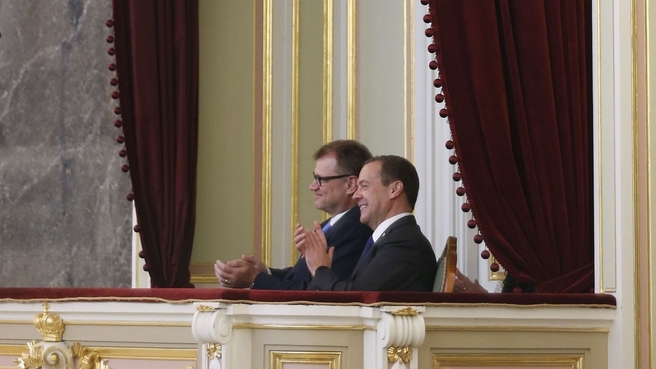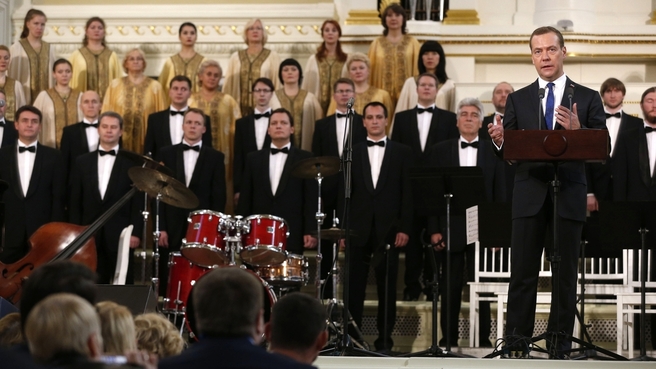Dmitry Medvedev and Prime Minister of Finland Juha Sipila at the forum’s opening ceremony.
The Russian-Finnish Cultural Forum has been held every year, alternatively
in Finland and Russia, since 2000.
The main goal of the forum is to enhance the importance of culture in bilateral relations and support the development of regions of both countries.
The forum is attended by representatives of the parliaments, ministries of education, culture, foreign affairs and government agencies responsible for regional development, as well as members of creative unions, public organisations, and Russian and Finnish cultural institutions interested in promoting promising creative projects.
Visit
In 2017, the 18th Russian-Finnish Cultural Forum, “100 Images of Culture”, is taking place in St Petersburg on 21-23 September as part of the celebrations of the 100th anniversary of Finland’s independence.
Excerpts from the transcript of the opening ceremony of the Russian-Finnish Cultural Forum
Dmitry Medvedev: First of all, permit me to read out the Message of Greetings of President Vladimir Putin of the Russian Federation to the participants and guests of the 18th Russian-Finnish Cultural Forum:
“Dear friends,
“I cordially welcome you on the occasion of the opening of another Russian-Finnish Cultural Forum.
“This year the Forum is timed to coincide with the centenary of the independence of Finland, and its scale is larger than usual. Among its guests are representatives of government agencies, regional and local authorities, members of parliament, as well as representatives of culture and the arts, science and education.
“The extensive programme of the Forum confirms that Russian-Finnish cultural cooperation is on the rise. Active exchanges are taking place between cultural institutions, educational establishments, and non-governmental organisations. Festivals and tours of performing groups are held regularly, and useful joint educational projects are implemented.
“I expect that during the course of the discussions at the Forum new interesting ideas and initiatives will be put forward that seek to further expand bilateral cultural ties, and strengthen trust and mutual understanding between the peoples of Russia and Finland.
“I wish the participants in the Forum successful work and all the best.
“President of the Russian Federation Vladimir Putin.”
During the past hundred years our countries have traversed a long path, which has not always been smooth. There were periods of very serious complications and periods of full-scale cooperation. Against the background of the post-war division of Europe, and indeed of the whole world, it was a unique example of neighbourliness, and we would like our relations to continue to be based on these same principles.
Our countries are close partners, and the peoples of our countries have great sympathy for each other.
This year a record number of Forum participants have come to St Petersburg.
This year also saw performances by the Bolshoi Theatre at the Savonlinna Festival, the Mariinsky Theatre at the summer musical festival in Mikkeli, the Russian Theatre Season in Helsinki, as well as Russian Film Week in the Finnish capital and Finnish film festivals in Russian regions.
Just recently, the Government submitted for ratification the decision on the status of the Finland House in St Petersburg. After the adoption of the corresponding laws, our Finnish friends will be able to call it truly their own house.
Juha Sipila: The Cultural Forum is different from other events held in St Petersburg to mark the 100th anniversary of Finland, as it is being attended by an exceptional number of people involved in culture and the arts – 450.
There was an open search process for partners for 2,500 cultural projects. About 5,000 people were involved in this process. Talks are underway for some 140 cultural projects.
Young people are the future of the Cultural Forum, therefore, we must ensure that young participants and their projects gain more prominence in the forum in the future.
Every autumn, Finnish universities present their academic programmes in Moscow and St Petersburg at the popular Study in Finland events.
In St Petersburg, there are over 10 schools where Finnish is taught. It also taught at about 15 universities throughout Russia.
A large number of Russians or Russian-Finnish families live in Finland. Russian is taught in many Finnish schools.
For more than 20 years contacts between Finland and Russia have generated a dialogue in the field of culture and the arts with the Finno-Ugric regions of Russia. Encouraging the study of the native tongue was the main theme of the World Congress of Finno-Ugric peoples held last year in Lakhti.
Networks of contacts, as well as platforms for culture and the arts are being created in the framework of the Barents Euro-Arctic Council and in the framework of the Northern Dimension Partnership on Culture. The Barents Joint Working Group on Culture is preparing a prize for cultural activities in this region.
The Northern Dimension Partnership on Culture has, since 2010, been promoting creative cooperation in the economic and cultural spheres. In particular, project activities are supported in the sphere of cultural tourism and information technology. The next forum of the Northern Dimension Partnership on Culture will take place here, in St Petersburg, in November.
Cooperation in the Baltic region has deep roots, especially in the field of cultural heritage.
The European Union and the Council of the Baltic Sea States have an active presence in the Baltic Sea region.
As for economic relations, after several years of recession, we are again entering a growth trajectory. The value of Finnish exports to Russia increased by 19 percent between January and June. The value of Finland’s imports from Russia increased by 60 percent. More than 400 Finnish companies are active in Russia, most of them located either in St Petersburg or in the Leningrad Region.
Tourism is also gaining momentum although the number of Finnish visas issued to Russian citizens is still well short of the record 2013 figures.
The Finns have been present in this region, in the City on the Neva, for hundreds of years. There is a Finnish church on Bolshaya Konyushennaya Street. Today it is the seat of the main church of Ingria, or the Evangelical Lutheran Church of Saint Mary.
In 1847, one of the first Finnish schools was
opened near the Church. The building later became the Finland House. The
question of ownership of the Finland House was the subject of negotiations, and
an intergovernmental agreement has been signed to transfer ownership of the
building to the Finnish state.













